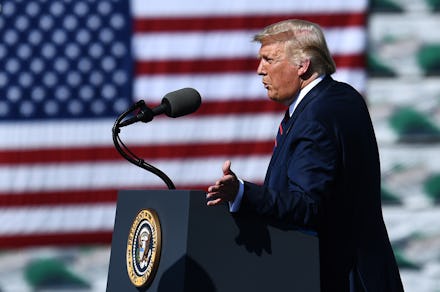Trump says he plans to send law enforcement to the polls this November

For months, President Trump has gone on and on about the potential of a rigged November election. Now, Trump says he's sending law enforcement to the polls to prevent supposed voter fraud. While Trump may position this idea as a way to protect the legitimacy of elections, it poses clear concerns for communities of color, for whom law enforcement flocking to the polls may simply translate to more voter suppression.
Trump made his comments while being interviewed by Fox News host Sean Hannity last night. During the interview, Hannity asked if Trump would "have an ability" to monitor fraud during the November elections. Trump responded, "We're going to have everything."
Trump went on to add, "We're going to have sheriffs, and we're going to have law enforcement. And we're going to have hopefully U.S. attorneys, and we've going to have everybody and [attorneys general]."
Trump may frame placing law enforcement at the polls as a way to protect the election's legitimacy, but in reality it will likely just make voting even more difficult for already suppressed communities. In 2018, a survey from The Atlantic and the Public Religion Research Institute found that Black and Latinx voters were more likely to face barriers at the polls compared to white voters. It's hard to see how, in a summer defined by civil unrest due to policing, sending law enforcement to the polls would make those communities comfortable.
The president's assertions have already been met with backlash. Marc Elias, an election lawyer, tweeted, "Not without a legal fight he won't!" in response to Trump's comments.
This isn't the first time in history that Republicans have come under fire for concerns surrounding police and the polls. In fact, the Democratic National Committee once sued the Republican National Committee, claiming that the latter was trying to suppress Black voters through a variety of tactics — including placing armed, off-duty law enforcement at polling stations.
Thanks to the lawsuit, a 1982 decree limited the RNC's ability to challenge voters' qualifications. However, this decree was overturned in 2018. And just as Trump's hope to station law enforcement at the polls is concerning, his campaign's plans to dispatch tens of thousands of election watchers evokes similar concerns about voter suppression.
During the interview, Trump also went on his usual spiel against mail-in voting, claiming falsely that it would lead to fraud. Trump went so far as to single out the universal mail-in system in Nevada, stating without evidence that "they may send [ballots] to all Democrat areas, not to the Republican areas as an example. Could be the other way too, but I doubt it."
While Trump continues to bash mail-in voting — despite casting a mail-in ballot in Florida this week — other Republicans are quietly pushing the system. Overall, his commentary is all part of a larger campaign to question the legitimacy of the 2020 elections before they even take place. It's not a coincidence that on Monday, Trump told supporters, "The only way we’re going to lose this election is if the election is rigged."